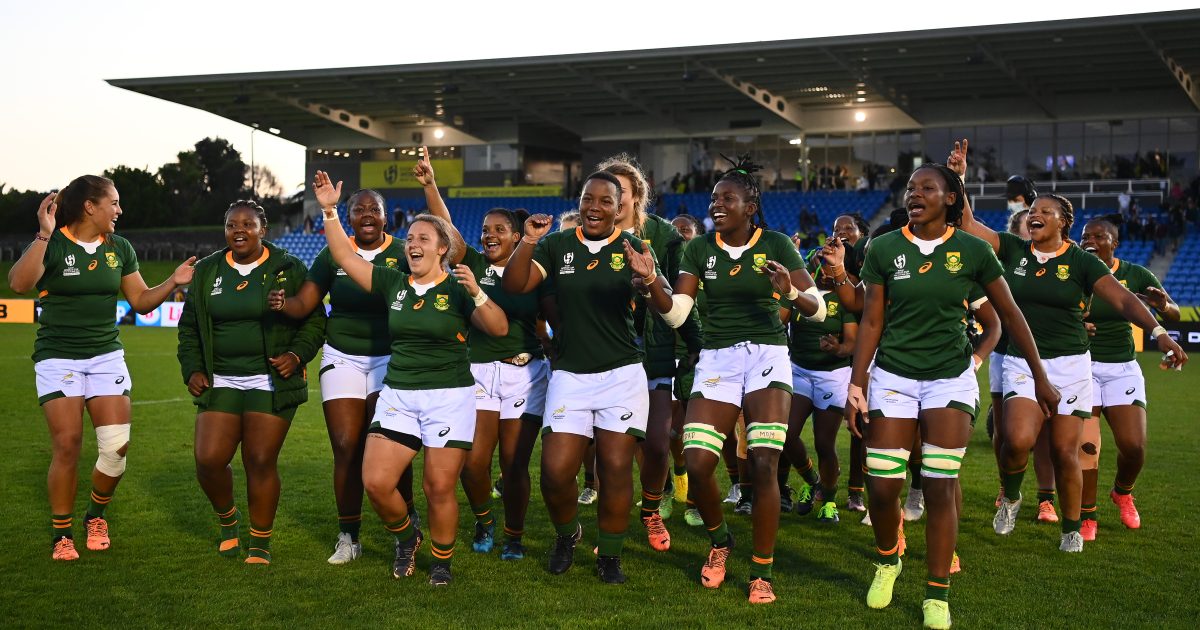South Africa Rugby to centrally contract players with new league

South Africa Rugby have announced that they will be launching Women’s Super League Rugby, an elite competition involving centrally contracted players, in 2025.
They plan to contract as many as 150 players with the “ambition of seeing the Springbok Women emulate their male counterparts by winning the Rugby World Cup.”
It is thought that there will be no more than four or five teams competing, depending on the quality of the submissions put forward by the provincial rugby unions.
SA Rugby have committed to covering the costs of flights and accommodation as well as other expenses for the competing franchises, who will join on a three-year basis.
Contracted players, who will be identified by the SA Rugby High Performance department, will be divided among the teams. The successful franchises are to be announced in October this year.
Those bidding for a place will be required to provide sufficient responses related to minimum standards for: “Governance and funding; player development; coaching; medical and support services such as strength and conditioning, analysis and nutrition; the training and match-day environment; marketing and communications and commercial activities.”
The Bulls Daisies are currently the only contracted full-time squad in their existing league, and it is hoped that the WSLR will be a significant step in levelling the playing field.
The Springbok Women participated in their first Rugby World Cup in eight years in 2022 after not entering in 2017. They finished fourth in their pool having not won a match.
Big news on #WomensDay! SA Rugby will be launching an elite, Women’s Super League Rugby competition with centrally contracted players to boost the game in SA – more here: https://t.co/uYWAdvEX4G ❤ #MakeItCount #ETTIG #RiseUp #DareToPlay pic.twitter.com/sJCbWHBIKb
— SA Women’s Rugby (@WomenBoks) August 9, 2024
They secured their qualification for Women’s Rugby World Cup 2025 with their Rugby Africa Women’s Cup victory, beating Madagascar 46-17 in the final match.
For a second year, they will compete in WXV 2 on home soil, with three rounds taking place at Cape Town’s DHL and Athlone Sports stadiums this September and October. They will face Japan, Australia, and Italy from 27th September – 12th October with Scotland and Wales also competing in the cross-pool format.
Speaking on the announcement, which was confirmed on South Africa’s National Women’s Day, president of SA Rugby Mark Alexander said: “This is a momentous day for women’s rugby in South Africa.
“The women’s game is making amazing strides across the world and in South Africa and we want to match that growth by providing an appropriate aspirational, high-performance platform for South African women.
“There is work to be done but the plans we are making will meet the needs of women rugby players and provide the quality of domestic competition that is needed to raise our international playing standards.
“Making this announcement on Women’s Day was done to underline SA Rugby’s commitment to the women’s game.
“We saw the impact of the women’s Sevens event at the Olympics and every measurement available points only to the growth of women’s sport and women’s rugby around the world.
“It has been a priority of ours for several years and this announcement marks a watershed moment for women’s rugby in South Africa.”
SA Rugby CEO Rian Oberholzer said: “The only professionalised women’s leagues in the world are in England and New Zealand and they have only been in operation for half a dozen years or so.
“They are not yet fully professional in the sense that we understand men’s rugby to be. Similarly, our South African model is for a professionalised WSLR with high standards of preparation, training and competition with players who have 12-month-a-year contracts but may also be in tertiary education or in full or part-time employment.
“This is a critical staging post on the ultimate goal of a fully professional women’s game around the world and it is investment for the exponential growth of rugby in South Africa.”
The Women's Rugby World Cup 2025 is coming to England. Click here to buy tickets.












































That is good to hear. I would prefer like a super 10 series against Aussie and NZ teams like before with the men's teams until NZ thought they going to get clever. They lost out big time there, and the Northern Hemisphere really scored in that regard. However, unlike the men's teams, SA women rugby is not strong. We could really benefit from playing in a league like that. It would also grow the game more because with an international competition like that, it would attract a lot of funding and also enable a lot of younger women to make it a professional career and sport. As long as women have to work and only practice now and then, they won't become better and grow. It's why the Bulls Daisies is so much better and there is no team in SA that can match them. They have professional contracts like the men. It's their job to play and that is it. They deserve to get that chance to become professional players and make it a career.